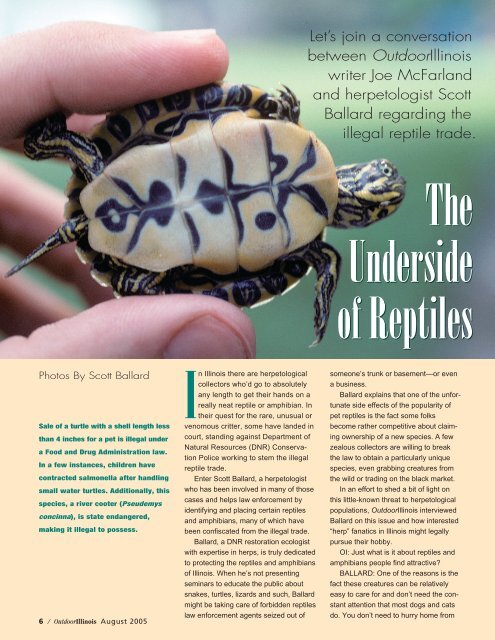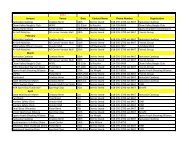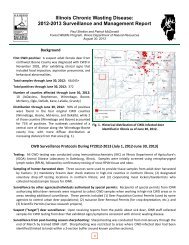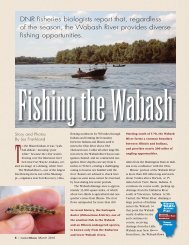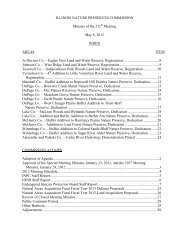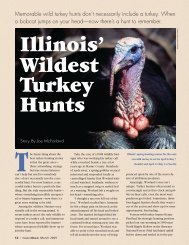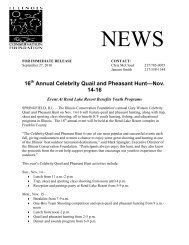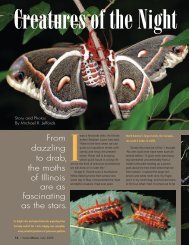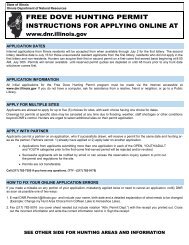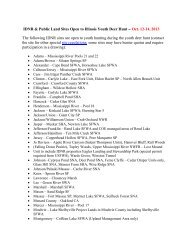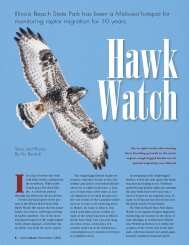Illegal Reptile Trade - Illinois DNR
Illegal Reptile Trade - Illinois DNR
Illegal Reptile Trade - Illinois DNR
- No tags were found...
You also want an ePaper? Increase the reach of your titles
YUMPU automatically turns print PDFs into web optimized ePapers that Google loves.
Let’s join a conversationbetween Outdoor<strong>Illinois</strong>writer Joe McFarlandand herpetologist ScottBallard regarding theillegal reptile trade.TheUndersideof <strong>Reptile</strong>sPhotos By Scott BallardSale of a turtle with a shell length lessthan 4 inches for a pet is illegal undera Food and Drug Administration law.In a few instances, children havecontracted salmonella after handlingsmall water turtles. Additionally, thisspecies, a river cooter (Pseudemysconcinna), is state endangered,making it illegal to possess.6 / Outdoor<strong>Illinois</strong> August 2005In <strong>Illinois</strong> there are herpetologicalcollectors who’d go to absolutelyany length to get their hands on areally neat reptile or amphibian. Intheir quest for the rare, unusual orvenomous critter, some have landed incourt, standing against Department ofNatural Resources (<strong>DNR</strong>) ConservationPolice working to stem the illegalreptile trade.Enter Scott Ballard, a herpetologistwho has been involved in many of thosecases and helps law enforcement byidentifying and placing certain reptilesand amphibians, many of which havebeen confiscated from the illegal trade.Ballard, a <strong>DNR</strong> restoration ecologistwith expertise in herps, is truly dedicatedto protecting the reptiles and amphibiansof <strong>Illinois</strong>. When he’s not presentingseminars to educate the public aboutsnakes, turtles, lizards and such, Ballardmight be taking care of forbidden reptileslaw enforcement agents seized out ofsomeone’s trunk or basement—or evena business.Ballard explains that one of the unfortunateside effects of the popularity ofpet reptiles is the fact some folksbecome rather competitive about claimingownership of a new species. A fewzealous collectors are willing to breakthe law to obtain a particularly uniquespecies, even grabbing creatures fromthe wild or trading on the black market.In an effort to shed a bit of light onthis little-known threat to herpetologicalpopulations, Outdoor<strong>Illinois</strong> interviewedBallard on this issue and how interested“herp” fanatics in <strong>Illinois</strong> might legallypursue their hobby.OI: Just what is it about reptiles andamphibians people find attractive?BALLARD: One of the reasons is thefact these creatures can be relativelyeasy to care for and don’t need the constantattention that most dogs and catsdo. You don’t need to hurry home from
work to prevent an accident on the carpetwhen you own a pet snake. Withproper preparation, you can even leavefor a short vacation and not worry aboutmost herps.OI: How popular is the hobby of herpetologyin <strong>Illinois</strong>?BALLARD: The popularity hasincreased during the past several years.It’s become so popular, in fact, there arelocal herpetological societies in Chicago,Peoria, Champaign and St. Louis. Theselocal herp societies provide a good placefor people who share this common interestto attend monthly meetings andexchange information about their hobby.Most of these societies also provide aservice to the general public by holdingannual shows to give people a chance tosee these magnificent creatures upclose, and—hopefully—get over theirfears of amphibians and reptiles. And forthose people who change their mind,some of the societies even have adoptionservices to help place unwantedherp pets into good homes.OI: So where does one legally acquirea reptile or amphibian? Which ones areillegal to own without a special permit?BALLARD: There are several lawsthat govern amphibians and reptiles in<strong>Illinois</strong>. Currently, it is illegal for a privateindividual to keep venomous species ofreptiles in captivity, regardless ofwhether “venomoid” surgery has beenperformed or not. It is illegal to buy, sell,trade or barter any wild-caught <strong>Illinois</strong>herpetofauna, their offspring, or any oftheir parts for commercial purposes. Thedaily catch limit for native <strong>Illinois</strong>amphibians and reptiles is eight perspecies, and the total possession limit is16 per species. It is illegal to collectPossession of a venomous pet,such as the deadly black mamba(Dendroaspispolylepis), is a violationof the <strong>Illinois</strong> Dangerous Animals Act.No private individual is allowed tokeep a venomous pet in <strong>Illinois</strong>,even if its venom ducts and glandshave been surgically removed.amphibians and reptiles from public landsuch as a state park, nature preserve,natural area or national forest without apermit from the appropriate agency.Those species listed as federally orstate endangered or threatened may notBefore the federally threatenedAmerican alligator (Alligatormississippiensis) can be possessed in<strong>Illinois</strong>, an endangered and threatenedspecies permit must be obtained fromthe Department of Natural Resources.August 2005 Outdoor<strong>Illinois</strong> / 7
Occurring naturally in Africa, theGaboon viper (Bitis gabonica), isknown to possess fangs up to 2 inchesin length. Possession of this snake in<strong>Illinois</strong> is a violation of the <strong>Illinois</strong>Dangerous Animals Act.be collected or kept in captivity without apermit from <strong>DNR</strong>.OI: What about those exotic reptileswe read about in sensational news stories,where police discover a hugepython in someone’s apartment?BALLARD: Although there currentlyis no specific list as to what is includedunder the term “life-threatening” reptiles,<strong>Illinois</strong> courts have considered a twoprongedtest be used to make such adetermination. First, is there a reasonablepossibility that the reptile will attacka human and, second, is that reptilecapable of killing a human. If the answerto both is yes, it would fall under the <strong>Illinois</strong>Dangerous Animals Act and possessionwould be prohibited. As anexample, in <strong>Illinois</strong>, a 15-foot Burmesepython has been declared by the courtto be a life-threatening reptile and thereforeillegal to possess.OI: How do I know which species Ican legally own? And which ones canlegally be bought or sold?BALLARD: Be careful where youbuy. Just because it’s for sale on theopen market doesn’t mean it can bebought or sold legally. There have beencases where even pet stores offered forsale certain reptiles and amphibianswhich were illegal to sell. Basically,licensees of the <strong>Illinois</strong> Department ofAgriculture (usually pet shops) may notoffer for sale or possess any species ofcrocodilian, any venomous species, orany boa or python 6 feet or larger.OI: Pets are one matter. But why dopeople breed and raise their own reptilesand amphibians? And does thataffect wild populations?BALLARD: Herpetoculture is thebreeding and raising of amphibians andreptiles. Many species of herps are naturallyvery colorful and the art of selectivebreeding by herpetoculturists hasproduced several color forms and albinomorphs that are simply spectacular toview. Along with some of the more colorfuland rare forms comes a high pricetag in order to acquire them. Many herpetoculturistswork hard at producingthese creatures, thus taking some pressureoff of the desire to collect them inthe wild for the pet trade. Captively producedamphibians and reptiles usuallydo very well in captivity, are better feeders,and lack the parasite load carriedby wild-caught stock.OI: Why, then, do poachers stealherps from the wild?BALLARD: Because of the sometimesvery lucrative business of herpetoculture,there are always those individualsthat do not want to spend the timeraising captive-bred herps to adults,then take the time to cycle them properlyso that they will breed in captivity andproduce offspring. There is less overheadto just go out into the wild and collectas many amphibians and reptiles asyou can, then sell or trade them to makeA creature of northern <strong>Illinois</strong> marshand wetland habitats, Blanding’sturtle (Emydoidea blandingii) has beendesignated a state-threatened speciesbecause of habitat loss and collectionof individuals for the pet trade.8 / Outdoor<strong>Illinois</strong> August 2005
This Gila monster (Heloderma suspectum)was smuggled from Arizona, where it isa state-protected species, to <strong>Illinois</strong> in acar door. In addition to violation of the<strong>Illinois</strong> Dangerous Animals Act, thetransporting party violated the federalLacy Act by moving an illegallyobtained species across state lines.some quick money. Additionally,because of their rarity, seldom-seenspecimens that are endangered orthreatened bring more money than docommon species. Some keepers ofsnakes, bored from maintaining most ofthe non-venomous species that areavailable, look for the excitement ofkeeping something venomous.OI: How many law-breakers are outthere?BALLARD: Most people who keepamphibians and reptiles as pets are lawabidingcitizens and maintain speciesthat are legal. It needs to be pointed outthat those who are arrested in illegalherp cases are a small percentage ofthe whole herpetoculturist hobby. Privatecitizens can help <strong>DNR</strong> by reportingillegal activity to their local ConservationPolice Officers. It is important to protect<strong>Illinois</strong>’ amphibian and reptile resources.Many of these species are importantlinks in the food chain, and some aregood environmental indicators. Currently,24 of the state’s 102 species ofamphibians and reptiles are consideredendangered or threatened.OI: What else is being done to protectthis resource?BALLARD: <strong>DNR</strong> has created a <strong>Reptile</strong>Task Force and is looking intochanges that can be made to furtherconserve these resources. The taskforce is also working with the <strong>Illinois</strong>Department of Agriculture to revise theDangerous Animals Act as it pertains toreptiles. These proposed changes willbe discussed with the local herpetologicalsocieties as the process proceeds,and input will be taken to create a mutuallybeneficial situation in protecting <strong>Illinois</strong>’herpetofaunal resources and creatinglegislation the herp community canlive with.Possession of a black Pakistan cobra(top, Naja naja) or a monocled cobra(Naja kaouthia) is a violation of the<strong>Illinois</strong> Dangerous Animals Act. Thismonocled cobra is an albino, a traithighly sought after in the pet trade.Both species are native to India andsurrounding areas.August 2005 Outdoor<strong>Illinois</strong> / 9


